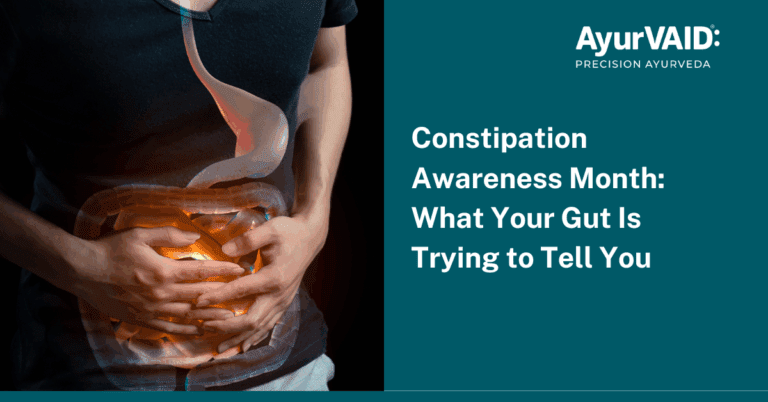Introduction
Mental wellbeing is not an emergency tactic; it is a daily discipline. Every day, in between mental health days and other days, little habits that you do over and over again build resilience in your brain and body. This short, practical guide gives you the top 10 tips to maintain your mental health through an Ayurveda lens — anchored in classical principles and supported by modern clinical studies. Use these habits to improve mental health every day, and you will notice a steadier mood, clearer thinking, and deeper rest.

Mental Health – Ayurveda View
In Ayurveda, mental health is the natural expression of a balanced body, mind and spirit — when Sattva predominates, Agni digests experience and food well, and Ojas is abundant. Disturbance of these elements (dosha–manas interaction) produces anxiety, irritability or heaviness: Vata produces fear and restlessness, Pitta gives anger and irritability, and Kapha leads to dullness and inertia. Prajnaparadha — acting against one’s own wisdom — is a key, often overlooked cause of chronic mental imbalance.
Rather than emergency fixes, Ayurveda prescribes daily, preventive care: Dinacharya (a stable routine), nourishing, digestible food to support Agni, gentle self-massage (Abhyanga) to ground Vata, short Pranayama and meditation to calm the nervous system, and restorative sleep to preserve Ojas. These simple habits to improve mental health form the core of resilience and are practical to practise on a mental health day (October 10) or every day.
Therapeutically, three integrated approaches guide care. Satvavajaya Chikitsa (mind-strengthening) uses counselling, cognitive training, and meditation to build Sattva; Yuktivyapashraya applies diet, lifestyle, and medhya rasayanas to rebuild tissues and correct Agni; Daivavyapashraya offers spiritual and community support where meaningful. Clinical sequences often begin with mild cleansing (when needed), followed by Rasayana to consolidate gains.
Ayurveda’s strength lies in personalised, longitudinal care — not quick fixes. When daily routines are restored and root causes addressed, mental stability follows: clearer thought, steadier mood and durable resilience. For persistent or severe symptoms, integrate Ayurveda with conventional mental-health care under a clinician’s guidance.
For everyday application, follow these top 10 tips to maintain your mental health. These practices reduce Rajas and Tamas while strengthening Sattva and Ojas.
- Rise with a gentle routine (Dinacharya)
Ayurveda places enormous importance on waking with light and following a gentle morning sequence: tongue scraping, warm water, modest stretching and a short period of mindfulness. A predictable start regulates circadian biology and supports mental health awareness by reducing decision fatigue and stabilising mood.
- Self-massage (Abhyanga) — 5–10 minutes
Daily oil self-massage calms Vata, soothes the nervous system and improves sleep quality — all central to mental stability. In practical terms, a warm sesame or light herbal oil rubbed for a few minutes before showering is profoundly grounding.
- Breath practice (Pranayama) — 5–15 minutes
Conscious breathing balances autonomic tone, reduces anxious arousal and improves emotional regulation; regular practice is one of the most efficient habits to improve mental health. Mind-body trials (yoga/pranayama programs) show consistent short-term reductions in depressive symptoms and anxiety.
- Moderate, nourishing meals timed to support Agni
Eat digestible, regular meals that suit your constitution — avoid heavy food late at night and favour warm, cooked dishes when digestion is weak. Stable blood sugar and robust Agni reduce irritability, brain fog and low-mood swings.
- Short daily movement (yoga or gentle exercise)
Twenty to thirty minutes of conscious movement — asana, brisk walking or simple stretches — improves mood, sleep and cognitive clarity. Systematic reviews of yoga show clinically meaningful reductions in depression severity when used as an adjunctive practice.
- Digital boundaries — create a “screen sunset”
Limit screens for at least 60–90 minutes before sleep and build micro-breaks during the day. Digital overload heightens Rajas (restlessness) and fragments attention; creating boundaries is one of the simplest top 10 tips to maintain your mental health.
- Cultivate Satvavajaya (mind training) — journaling & gratitude
Spend five minutes each evening noting three things you are grateful for and one short lesson from the day. Simple reflective practice strengthens Sattva (clarity) and weakens the cycles of worry that fuel anxiety and insomnia.
- Short daily meditation (5–20 minutes)
Even brief daily meditation improves emotional regulation and reduces rumination. Modern trials show meditation and related mind-body therapies change brain networks involved in attention and mood; this is central to mental health awareness and sustained resilience.
- Gentle nasya/eye care and a screen-hygiene ritual
If you have heavy screen use, incorporate brief eye-rest exercises and, if appropriate, gentle Ayurveda nasya (a few drops of appropriate oil under a clinician’s guidance). Head and upper-airway self-care reduces tension headaches and irritability that can worsen mood.
- Sleep hygiene and restorative routine
Prioritise sleep timing, wind-down rituals and a cool, dark bedroom. Adequate, regular sleep protects Ojas (vitality) and prevents the low-grade inflammation and cognitive decline that follow chronic sleep disruption.
Integrating herbs & therapies
Rasayana strategies (e.g., clinically-selected rasayanas and short therapeutic procedures like Shirodhara under supervision) can accelerate recovery from stress and low mood in carefully selected patients. Randomised trials of Withania somnifera (ashwagandha) and Bacopa (Brahmi) show reductions in stress, cortisol and improvements in cognitive function — useful adjuncts to the daily habits above.
(Always consult a clinician before starting any supplement; individualisation matters.)






